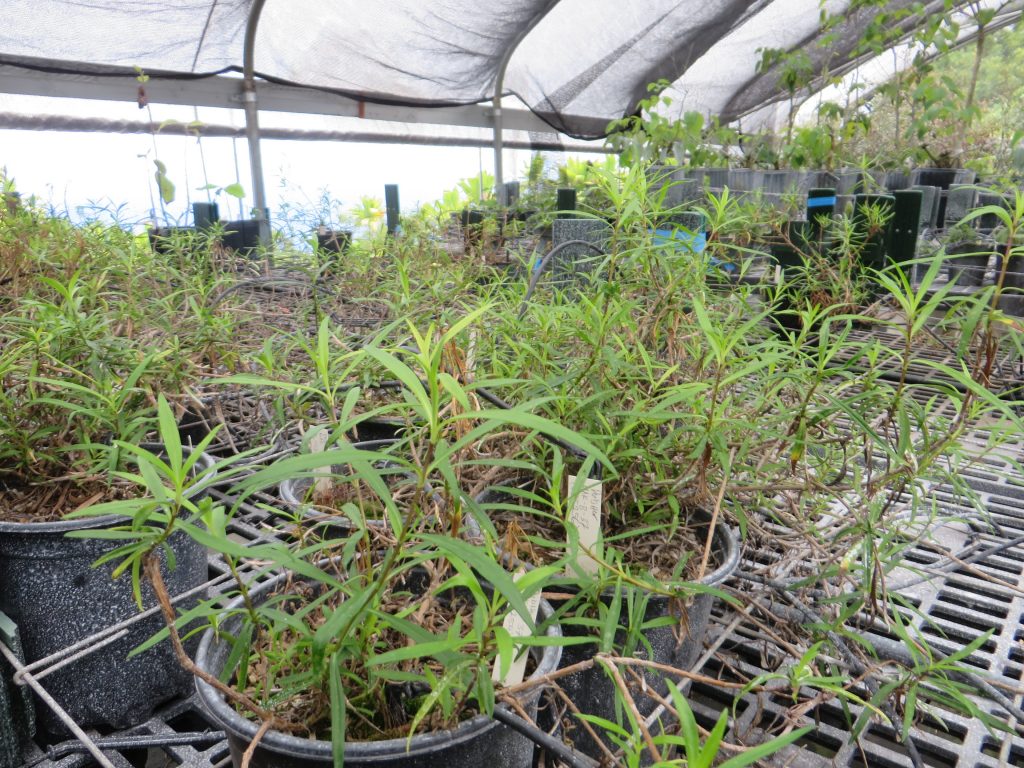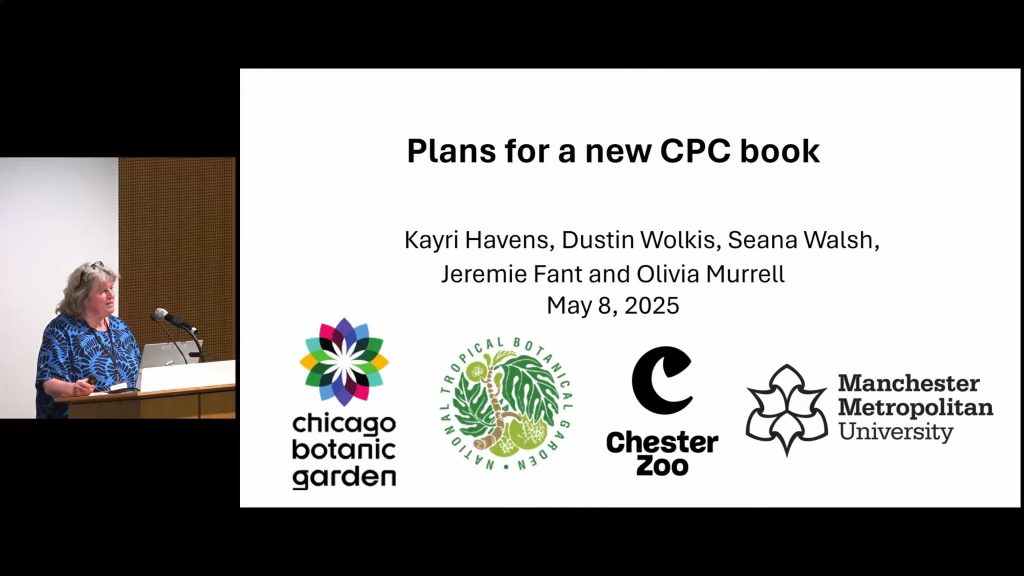
A team of CPC members from Chicago Botanic Garden, National Tropical Botanical Garden and Manchester Metropolitan University have begun work on a new edited volume that would serve as an update to the 2004 Ex Situ Conservation by Guerrant, Havens and Maunder. We will present the vision for this volume and invite attendees to review, […]
Read More…

SePPCon 2024: Protection, Endemism, & Capacity Enhancement Land Trusts and Private Lands: Preserving Biodiversity Through In-Situ Conservation Sara Johnson*, North American Land Trust Habitat loss is the number one threat to biodiversity worldwide, and land protection is our most effective tool for immediate impact. With around 60% of land in the United States under […]
Read More…

SeppCon 2024: Conservation Collections Development Collaborative Conservation for Florida’s Rare Plant Species: Seedbanking and the Florida Plant Rescue Initiative Tina Stanley* (1), Hanna Rosner-Katz (2) (1) Center for Plant Conservation, (2) Florida Natural Areas Inventory Florida is home to over 200 species of globally rare plants, many of which have never been secured in […]
Read More…

SePPCon 2024 Keynote Presentation, Day 2 Moving the Conservation Needle: Ex Situ Conservation, Ecological Research, and Building Botanical Capacity Kayri (Kay) Havens, Chicago Botanic Garden Rare plants are facing a multitude of threats, from habitat loss and invasive species to climate change and more. Effectively conserving these species requires maintaining collections ex situ, understanding […]
Read More…
Fairchild Tropical Botanic Garden maintains an ex situ collection of the globally critically imperiled Harrisia fragrans (fragrant prickly-apple cactus) from across its range on Florida’s east coast. The first flowers on our Ft. Pierce population opened after dark last summer in 2022. […]
Read More…
Fairchild Tropical Botanic Garden maintains an ex situ collection of the globally critically imperiled Harrisia fragrans (fragrant prickly-apple cactus) from across its range on Florida’s east coast. The first flowers on our Ft. Pierce population opened after dark last summer in 2022. […]
Read More…
These seeds are from plants of Florida Brickell-bush (Brickellia mosieri), a perennial herb in the Asteraceae. It is endemic to Miami-Dade County where it is only found in the globally imperiled pine rockland ecosystem fragments outside of Everglades National Park. It was federally listed as endangered in 2014 with critical habitat designated in 2015. […]
Read More…
Sachem skipper butterfly visiting flowers of pineland blackanthers (Melanthera parvifolia) at the Fairchild Tropical Botanic Garden nursery ex situ conservation living collection. […]
Read More…
Ex situ conservation living collection-generated seeds of pineland blackanthers, Melanthera parvifolia, a South Florida endemic species […]
Read More…
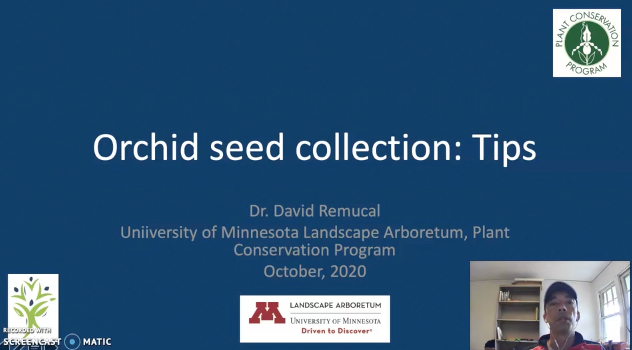
David Remucal, University of Minnesota Landscape Arboretum While many seedbanks avoid working with orchids, more groups are taking them on, or collecting them for groups that are. Collecting rules and protocols are not different for orchids but there are enough complexities in their biology to intimidate collectors new to orchids. Orchid seeds are the smallest in […]
Read More…

Dr. Valerie Pence, Cincinnati Zoo & Botanical Garden Although there are published protocols for initiating shoot cultures for over 20 oak species, the cryopreservation of oak shoot tips has not been reported. We have applied the droplet vitrification protocol to four species of oaks, including the endangered Q. hinckleyi, in order to evaluate the feasibility of […]
Read More…
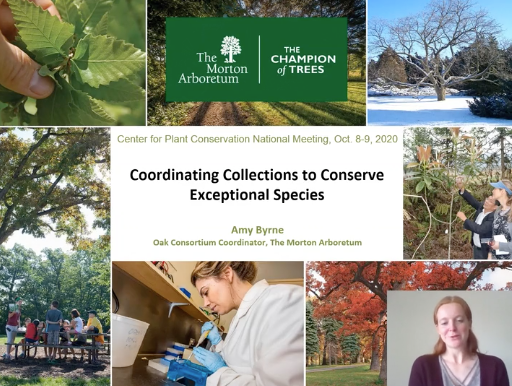
Amy Byrne, The Morton Arboretum A 2019 study by Griffith, et al. showed that gardens must collaborate to conserve genetic diversity, especially for exceptional species whose seeds cannot be conventionally seed banked. This process of capturing the genetic diversity of exceptional species in ex situ collections requires a tailored strategy for each species, emphasizing the need […]
Read More…
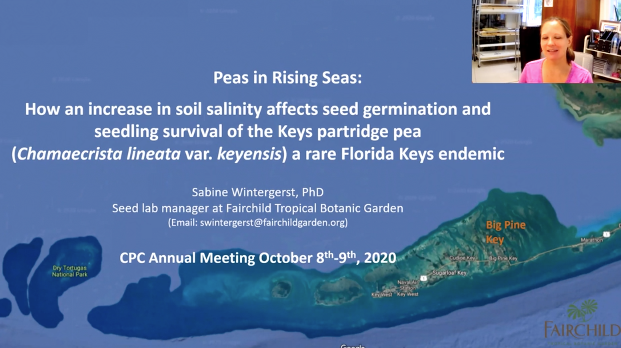
Sabine Wintergerst, Fairchild Tropical Botanic Garden The only known remaining populations of the Keys partridge pea (Chamaecrista lineata var. keyensis) are found within the imperiled pine rockland habitat on two islands of the Florida Keys. Like other low-lying islands, the Florida Keys are especially threatened by sea level rise. As a consequence, soil salinity levels will […]
Read More…
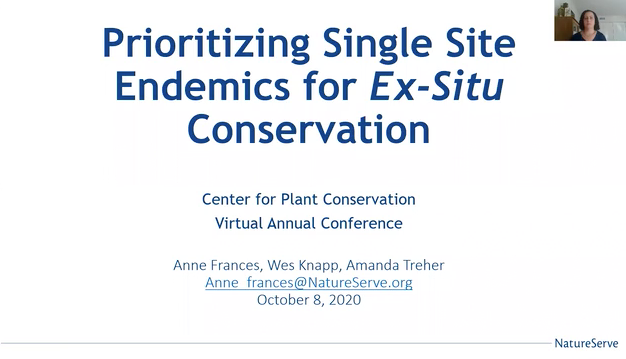
Anne Frances, NatureServe; Amanda Treher, NatureServe; Wesley Knapp, North Carolina Natural Heritage Program Plants that occur in only one to few locations globally are most at-risk of extinction. Research on the extinct plants of North America shows that 64% of extinct plants were known from one site. Single site endemics generally face higher threats than plants […]
Read More…
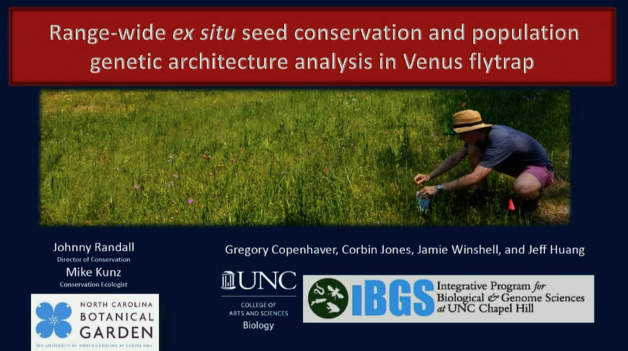
Dr. Johnny Randall, North Carolina Botanical Garden The infamous Venus flytrap, Dionaea muscipula, found across North Carolina and into South Carolina, has been seen to be declining in recent years. It is currently under review for federal listing, is ranked G2 on NatureServe, and considered vulnerable by RedList. Threats to this charismatic plant include poaching, […]
Read More…
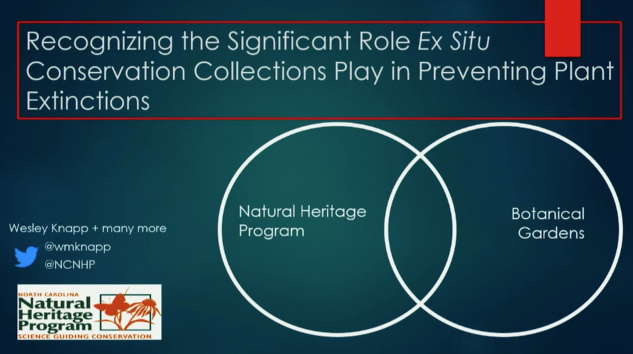
Wesley M. Knapp, North Carolina Natural Heritage Program Preventing extinction is the lowest bar for conservation success we can set and the roll of ex situ conservation efforts in preventing extinction is becoming more significant. Continued work to document the extinct plants of North America north of Mexico has resulted in the discovery that up […]
Read More…
Dr. Sean Hoban, The Morton Arboretum, Taylor Callicrate, Species Conservation Toolkit Initiative, Chicago Zoological Society, Susan Deans, Plant Biology and Conservation Program, Northwestern University, Michael Dosmann, The Arnold Arboretum of Harvard University, Jeremie Fant, Chicago Botanic Garden, Oliver Gailing, University of Göttingen, Kayri Havens, Chicago Botanic Garden, Andrew Hipp, The Morton Arboretum, Priyanka Kadav, Michigan […]
Read More…




